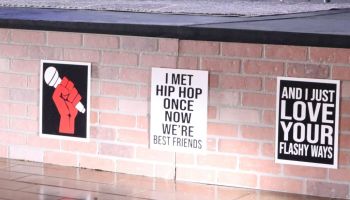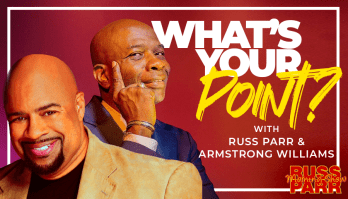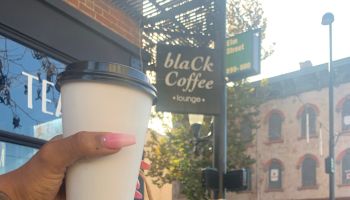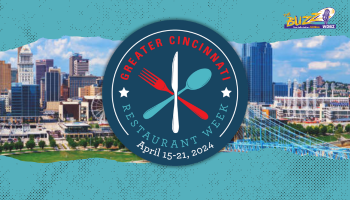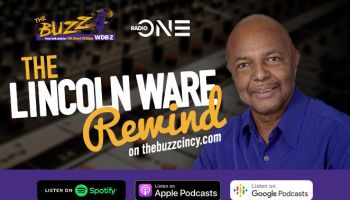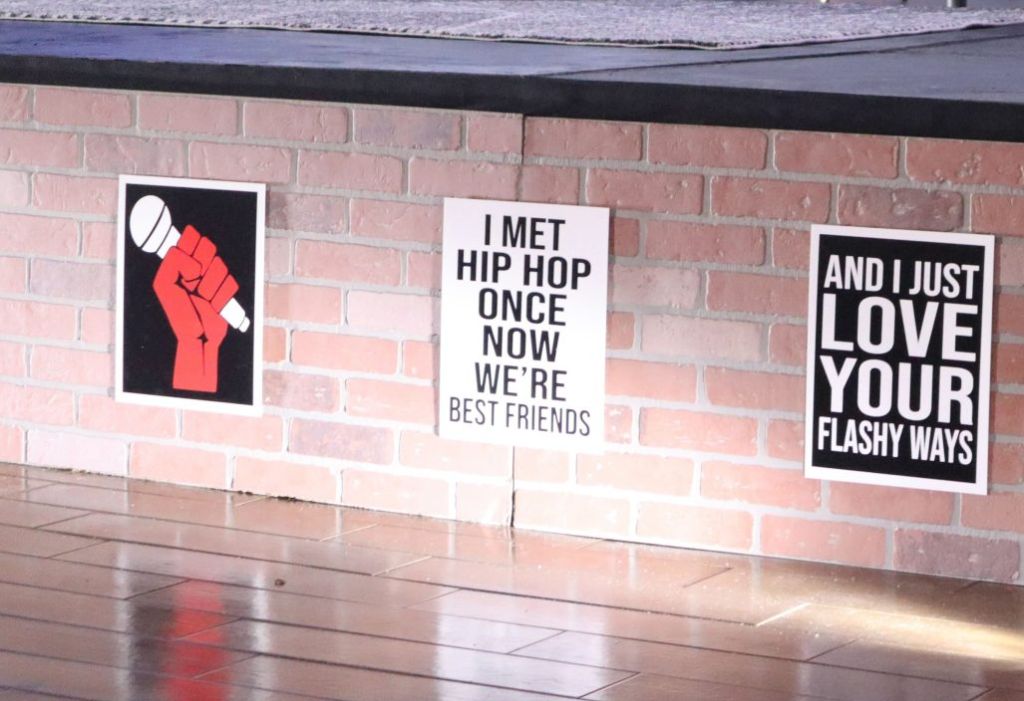
The ACLU of Georgia recently hosted a panel, “Rap On Trial Source: Anoa Changa / iOne Digital
The discussion about using rap lyrics in a criminal trial isn’t new, but the recent case against Atlanta rapper Young Thug and other members of YSL has revived the topic. Responding to the moment, the ACLU of Georgia and the Inner-City Muslim Action Network recently cohosted a panel bringing together legal experts, elected officials and rappers in a discussion about the current iteration of this issue.
“Rap on Trial: A Discussion on Free Speech & Racial Justice” featured Andrea L. Dennis, associate dean for Faculty Development at the University of Georgia’s School of Law and co-author of “Rap on Trial,” attorney Mawuli Davis, Mariah Parker PhD and Robert “Fleetwood” Bowden.
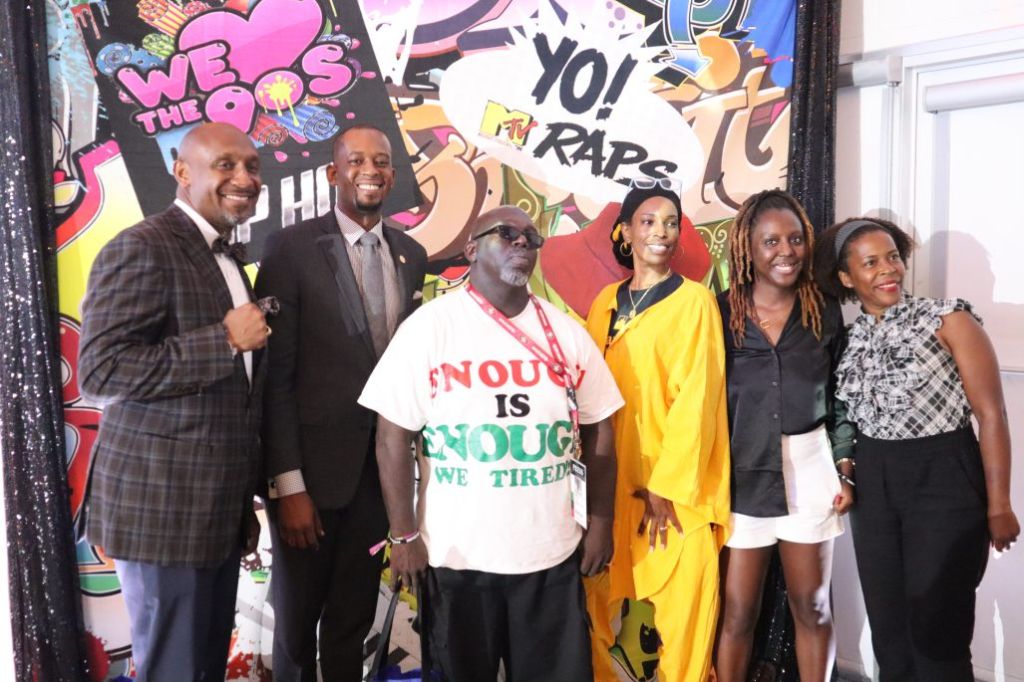
Panelists and Atlanta City Councilman Antonio Lewis post for a picture after the “Rap on Trial” panel. Source: Anoa Changa / iOne Digital
Dennis has been at the forefront of this issue for decades. Dennis and her co-author Erik Neilson ask on their site, should country singer Johnny Cash have been charged based on the lyric “I shot a man in Reno, just to watch him die”? It’s a classic line from a timeless song called “Folsom Prison.”
While some wondered if the man in Black had shot someone or if he had ever been in prison, Cash wasn’t charged with attempted murder of some unknown victim. But some rappers find themselves the subject of prosecution largely because of their lyrics.
During the panel discussion moderated by Minister Server Tavares, Dennis said the rap on trial phenomenon presents itself in two ways. According to Dennis, this shows first by using lyrics, videos or related marketing materials in the criminal legal process.
“This could be anywhere from an investigation, all the way through sentencing and corrections,” Dennis explained. “The other way we think about rap on trial is when the lyrics themselves are an instrument of the crime.
She said that this presents the lyrics themselves being considered the crime, such as claims the lyrics constitute a threat or terroristic threat. The other way is the lyrics being used as evidence of criminal behavior.
“We see it now happening is that some artists are being accused of supporting and promoting and dedicating gang activity or other themselves benefiting in their artistic careers through the creation of lyrics,” Dennis continued. “In some jurisdictions, that is a crime to promote, support facilitate, help criminal activity through talking about the exploits of others.”
She said that the last version is relatively rare but particularly worrisome. When asked about using free speech as a defense, Dennis called the First Amendment a “hot mess.”
Davis expressed concerns about how far the use of lyrics will go. Youth in an organization he co-leads, Black Men Lab, have been working on a Trap album. He also raised the question of whether young people should watch what they say or how they say it.
Fallon McClure, deputy director of policy and advocacy at the ACLU of Georgia, said rappers deserve the same protections as other artists.
“Rappers should have the same allowances for artistic expression as artists of other music genres, and they should be free to share their creative lyrics without fear of prosecution,” McClure said. “When rap is introduced as evidence in criminal trials, studies show that juries routinely take the lyrics as literal, ignoring the extensive use of wordplay, puffery, and narrative fiction in rap music.”
Other organizations supporting the effort include the Southern Center for Human Rights, Black Voters Matter and Black Men Build. The evening closed out with a performance by Parker, who raps under the name Linqua Franca.
Speaking with NewsOne, Parker said it was important to meet young people where they are and honor where they are at. They said the issue isn’t the expression but the systems around us.
“At the end of the day, it’s the system that needs fixing,” Parker said. “The system that has created a situation where there’s so much violence in our communities and the system that is putting our people away for that.”
But Parker also wanted young people to know that choosing to be an artist doesn’t mean it has to just be either success or struggle and giving back. Also, they said that people don’t have to be perfect to make a difference or be leaders.
“The table is shook hardest by folks with slightly grimy slates, not those blank slates,” Parker said. “Those blank slates don’t get sh*t done. That is the intersection for me. It’s like exhibiting authenticity, exhibiting radical integrity, as opposed to trying to sell perfectionism to people who already think it’s whack and fake.”
SEE ALSO:
‘Threats To Kill Or Harm Witnesses’ In Young Thug RICO Case Is A Serious Concern, Prosecutors Say
Rapper Young Thug Booked And Busy After Atlanta Arrest On RICO And Gang Charges
The post ACLU Of Georgia and Inner-City Muslim Action Network Explore ‘Rap On Trial’ appeared first on NewsOne.
ACLU Of Georgia and Inner-City Muslim Action Network Explore ‘Rap On Trial’ was originally published on newsone.com








